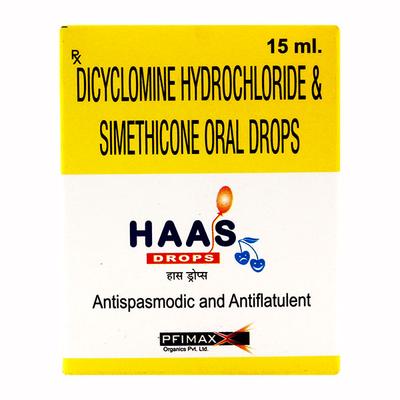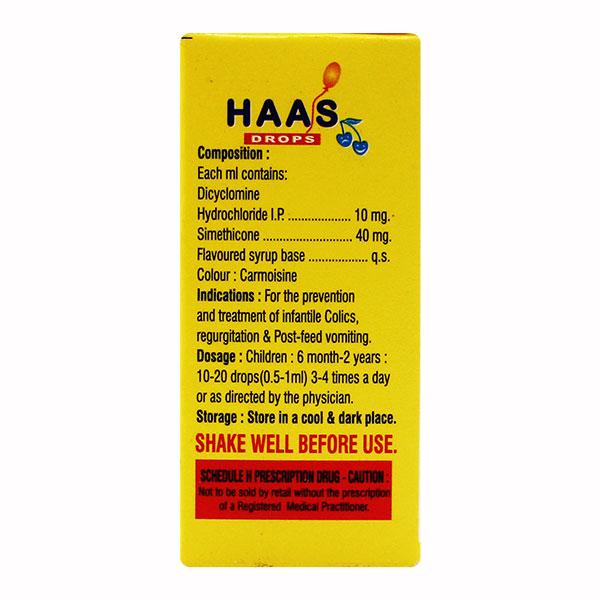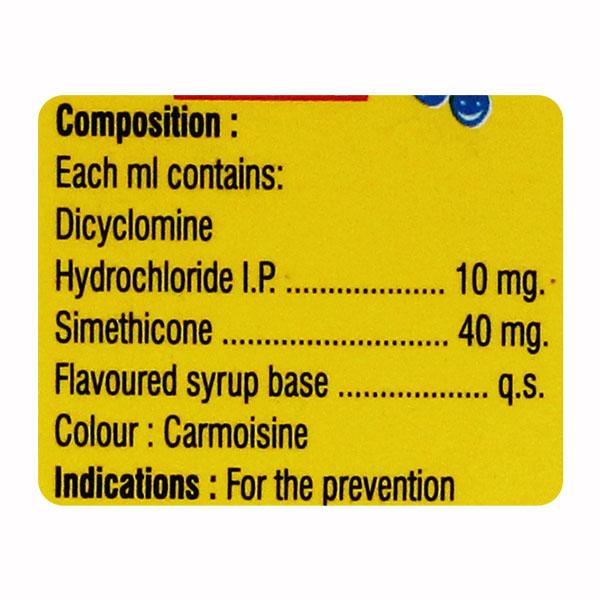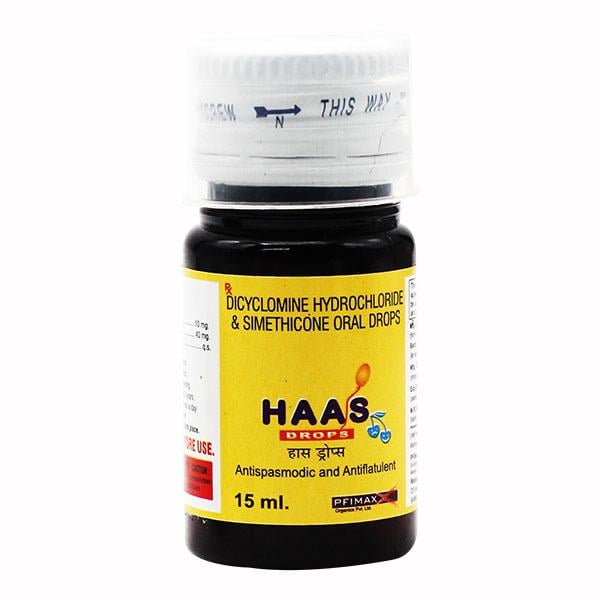

Netmeds First Membership
Quick Links
Introduction About HAAS DROPS
HAAS DROPS is a combination of Dicyclomine and Simethicone which belongs to the group of medicines called Antispasmodics and Anti flatulent agents, respectively. HAAS DROPS is used to provide relief from infantile colic (persistent crying in infants), gastrointestinal tract spasm, flatulence, and abdominal discomfort that occurs due to excessive gas formation in disorders such as dyspepsia (indigestion) and gastro-oesophageal reflux disease (digestive disorder) in affected children.
HAAS DROPS is not recommended for use in children allergic to Dicyclomine, and/or Simethicone. It is also not recommended for use in children with obstructive uropathy (obstructed urinary flow), intestinal obstruction, severe ulcerative colitis (inflammatory bowel disease), reflux esophagitis (inflammation of the oesophageal mucosa), unstable cardiovascular status in acute haemorrhage (blood loss), glaucoma (increased eye pressure), and/or myasthenia gravis (autoimmune neuromuscular disease).
Before administering HAAS DROPS, inform your doctor if the child is suspected of glaucoma, and/or have hiatus hernia with reflux esophagitis (inflammation of the oesophageal mucosa), thyrotoxicosis (high thyroxine level in blood), high blood pressure, liver problems (such as impaired hepatic function), kidney problems (such as renal impairment), and/or heart problems (such as coronary heart disease).
HAAS DROPS is not recommended for use in pregnant and breastfeeding women as it is intended to be used only in children. HAAS DROPS is not recommended for use in infants (aged below 6 months). Consult your doctor before administering the medicine to the child. HAAS DROPS is not recommended for use in elderly patients as it is intended to be used only in children.
The most common side effects of administering HAAS DROPS in child are dry mouth, nausea, blurred vision, dizziness, sleepiness, and/or weakness. Consult your doctor if any of these symptoms becomes worse in the child.
Uses Of HAAS DROPS
Used in paediatric patients to provide relief from:
- infantile colic (persistent crying in infants)
- gastrointestinal tract spasm
- flatulence
- abdominal discomfort
How HAAS DROPS Works
HAAS DROPS works by providing relief from excessive gas formation that occurs due to dyspepsia/gastro-oesophageal reflux disease, where Dicyclomine relieves abdominal cramps and pain by relaxing muscles in stomach and gut, and Simethicone facilitates easy gas passage by disintegrating gas bubbles in affected children.
How to use HAAS DROPS
Administer HAAS DROPS in child as advised by your physician. Shake well before use. Your doctor will decide the exact dose and duration of management for your child depending on child’s age, body weight and disease condition.
Side Effects Of HAAS DROPS
Common
- dry mouth, nausea
- blurred vision
- dizziness, sleepiness
- weakness
Rare
Stop administering HAAS DROPS and consult your doctor immediately in case the child experiences:
- signs of allergic reactions such as hives (red itchy welts), difficulty while breathing, and/or swelling of face/lips/tongue/throat
- decreased sweating, fever, and/or heat stroke
How To Manage Side Effects
Dry mouth:
Ask the child to drink plenty of cold water and sip on cold unsweetened drinks and use lip balm if child’s lips get dry. Ask the child to brush teeth twice a day. Consult your doctor if symptom gets worse in child.
Warning & Precautions
Pregnancy
HAAS DROPS is not recommended for use in pregnant women as it is intended to be used only in children.
Breastfeeding
HAAS DROPS is not recommended for use in breastfeeding women as it is intended to be used only in children.
Kidney
HAAS DROPS should be used with caution in children with kidney problems such as renal impairment. Consult your doctor before administering the medicine to the child.
Liver
HAAS DROPS should be administered with caution in children with liver problems such as impaired hepatic function. Consult your doctor before administering the medicine to the child.
Allergy
Do not administer HAAS DROPS if the child is allergic to Dicyclomine, Simethicone, and/or any other ingredients of this medicine.
Heart Disease
HAAS DROPS should be administered with caution in children with heart problems such as coronary heart disease and in children scheduled for any heart surgery. Consult your doctor before administering the medicine to the child.
Others
HAAS DROPS is not recommended for use in child if it:
- suffers from obstructive uropathy (obstructed urinary flow)
- suffers from intestinal obstruction
- has severe ulcerative colitis (inflammatory bowel disease)
- suffers from reflux esophagitis (inflammation of the oesophageal mucosa)
- has unstable cardiovascular status in acute haemorrhage (blood loss)
- suffers from glaucoma (increased eye pressure), myasthenia gravis (autoimmune neuromuscular disease)
Before administering HAAS DROPS, inform your doctor if the child:
- is suspected of glaucoma
- has hiatus hernia with reflux esophagitis (inflammation of the oesophageal mucosa)
- suffers from thyrotoxicosis (high thyroxine level in blood)
- has high blood pressure
Use in Paediatrics:
HAAS DROPS is not recommended for use in infants (aged below 6 months). Consult your doctor before administering the medicine to the child.
Use in Geriatrics:
HAAS DROPS is not recommended for use in elderly patients as it is intended to be used only in children.
Interactions
A. Drug-Drug interactions:
Before administering HAAS DROPS, inform your doctor if your child takes any of the following medicines:
- metoclopramide (used to manage nausea, vomiting, indigestion)
- antacids (used to relieve indigestion and heartburn) Ex. aluminium hydroxide, magnesium carbonate
- amantadine (used to manage Parkinson's disease)
- quinidine (used to manage irregular/fast heart rhythm)
- antihistamines (used to manage allergies) Ex. chlorpheniramine
- antipsychotic agents (used to manage psychosis) Ex. phenothiazine
- monoamine oxidase inhibitors (used to manage depression) such as tricyclic antidepressants (Ex. amitriptyline)
- medicines used as narcotic analgesics (Ex. meperidine)
- medicines used as a sympathomimetic (Ex. amphetamine)
- other medicines having anticholinergic activity
Overdosage:
If you or anyone else accidentally administers too much of HAAS DROPS to the child, then consult your doctor immediately or visit the nearby hospital. Symptoms of overdose that can occur in child are headache, nausea, vomiting, blurred vision, dilated pupils, hot dry skin, dizziness, dryness of the mouth, and/or difficulty in swallowing.
Synopsis
| Drug | : | Dicyclomine, Simethicone |
| Pharmacological Category | : | Antispasmodics, Anti flatulent agents |
| Therapeutic Indication | : | Provides relief from infantile colic, gastrointestinal tract spasm, flatulence, and abdominal discomfort |
| Dosage Forms | : | Drops, Oral Drops, Syrup, Suspension |
More Information
- Keep HAAS DROPS out of reach of children
- Do not store HAAS DROPS above 30°C
FAQs About HAAS DROPS
Q. What is HAAS DROPS used for?
A. HAAS DROPS is used to provide relief from infantile colic (persistent crying in infants), gastrointestinal tract spasm, flatulence, and abdominal discomfort that occurs due to excessive gas formation in disorders such as dyspepsia (indigestion) and gastro-oesophageal reflux disease (digestive disorder) in affected children.
Q. How HAAS DROPS works?
A. HAAS DROPS works by providing relief from excessive gas formation that occurs due to dyspepsia/gastro-oesophageal reflux disease, where Dicyclomine relieves abdominal cramps and pain by relaxing muscles in stomach and gut, and Simethicone facilitates easy gas passage by disintegrating gas bubbles in affected children.
Q. What are the most common side effects of administering HAAS DROPS in child?
The most common side effects of administering HAAS DROPS in child are dry mouth, nausea, blurred vision, dizziness, sleepiness, and/or weakness. Consult your doctor if any of these symptoms becomes worse in the child.
Q. How HAAS DROPS is administered to the child?
A. Administer HAAS DROPS in child as advised by your physician. Shake well before use. Your doctor will decide the exact dose and duration of management for your child depending on child’s age, body weight and disease condition.
Q. What happens if child is administered more than the required dosage of HAAS DROPS?
A. If you or anyone else accidentally administers too much of HAAS DROPS to the child, then consult your doctor immediately or visit the nearby hospital. Symptoms of overdose that can occur in child are headache, nausea, vomiting, blurred vision, dilated pupils, hot dry skin, dizziness, dryness of the mouth, and/or difficulty in swallowing.
References
1. K.D. Tripathi. Anticholinergic Drugs & Drugs Acting on Autonomic Ganglia and Antiemetic, Prokinetic & Digestant Drugs. Essentials of Medical Pharmacology. Seventh edition. 2013. Page – 117, 670.
2. P L B J Lucassen, W J J Assendelft, J W Gubbels, J T M van Eijk, W J van Geldrop, A Knuistingh Neven. Effectiveness of treatments for infantile colic: systematic review. NIH National Library of Medicine. National Center for Biotechnology Information. PMC PubMed Central. May 1998 [Accessed on 2nd July 2022] https://www.ncbi.nlm.nih.gov/pmc/articles/PMC28556/
3. Blue Cross Laboratories Pvt. Ltd. MEFTAL-SPAS Suspension. [Revised in January 2021] [Accessed on 2nd July 2022] https://bluecrosslabs.com/wp-content/uploads/2021/01/MEFTAL-SPAS-SUSP.pdf
4. Albia Biocare. Dicospas drops. [Accessed on 2nd July 2022] https://www.albia.in/product/paediatric-range/dicospas-drops?PageSpeed=noscript
5. Vellinton Healthcare. Vellspas Drops. [Accessed on 2nd July 2022] https://www.vellintonhealthcare.com/dicyclomine-hcl-simethicone-oral-drops-3469474.html
6. Green Cross Remedies. Mefcolic Suspension. [Accessed on 2nd July 2022] https://greencrossindia.com/p/mefcolic-suspention.html














